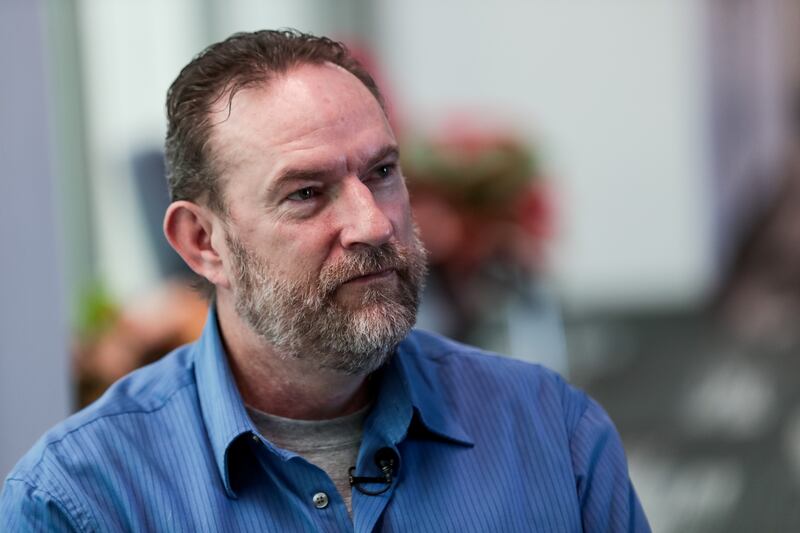SALT LAKE CITY — While others his age were raising kids and paying mortgages, Christopher Allen Wickham was in the Utah State Prison, serving more than 14 years for a sexual assault that happened while he was hospitalized in a different part of town.
With a signature from a judge this week, Wickham was declared factually innocent and awarded nearly $616,000 in lost wages. He had been released on parole in 2011 and was watching TV Tuesday when he got a text saying he’d been exonerated and his name removed from Utah’s sex offender registry.
“I am incredibly happy that it’s finally over,” he said. “I had faith that would come to light. The truth always comes to light. I just didn’t know how long it was going to take.”
The 50-year-old Wickham, a soft-spoken tool salesman who goes by Chris, said he has mixed feelings and struggles to describe his experience. He’s grateful for the attorneys who took up his case and warns others against rushing to judgement before carefully considering the facts. Most of all, he said he hopes to see changes in the criminal justice system that will help prevent future wrongful convictions.

He is one of two Utah men to be exonerated of sex crimes in the last week. The 58-year-old David Hawkins was found innocent on Sept. 6 and awarded more than $355,000 after two of his sons came forward to say they had falsely accused him of sexual abuse. He spent nearly eight years in prison before he was granted parole.
“I’m on Cloud Nine,” Hawkins told the Deseret News Friday.
“I told them a long time ago I forgave them,” Hawkins said of his sons. “All the right words have been shared. Now it’s just a matter of spending time together.”
Hawkins said he will attempt to retrieve his professional license and resume work as a chiropractor. He’s looking forward to traveling without having to secure permission from a parole officer, and to dating without criminal convictions looming over a relationship.
He sometimes feels resentful and angry about the time he lost, though he tries to steer himself away from those emotions, he said.
“I had to adopt a philosophy in prison to live in the moment,” Hawkins said. “If I lived in the past, I got angry, and if I lived in the future, I got frustrated.”
Wickham said his priority is to restore his relationship with his son and daughter, now in their mid-20s. He looks forward to crafting wooden cabinets and bowls at a workshop at his Salt Lake home, and to spending time with his wife, his mother and their silky terrier.
A born-again Christian, his faith helped him remain hopeful, he said in an interview in a law library at the University of Utah, where his attorneys with the Rocky Mountain Innocence Center are based. The Utah Attorney General’s Office did not fight Wickham’s legal effort to be exonerated, pointed out Jennifer Springer, the center’s managing attorney.
In 1997, a jury found Wickham guilty of two counts of aggravated sexual assault, a first-degree felony. He was sentenced to 20 years in prison.
Prosecutors alleged Wickham held down a 16-year-old girl while his friend raped her before taking his own turn assaulting her. The girl had gone to the party at Wickham’s house with a girl she had met at a mall, they argued.
Wickham recalled Friday he’d had friends over to celebrate his birthday on Dec. 29, 1995. He and a friend left the party, probably to get snacks, and got into a car crash. He had a gash in his head and a cast when he was discharged about 6:30 the following morning, he said.
Attorneys with the innocence center began looking into his case in 2014. They found Pioneer Valley Hospital records that provided Wickham with an airtight alibi at the time of trial, but his defense attorney hadn’t received a report with the exact time of the assault — 2 a.m. — while he was in the hospital.
His friend at the time, Robert Pliego, now 46, took a plea deal in the case, Springer said, and was sentenced to up to five years in prison. He signed a statement years later saying Wickham wasn’t present for the assault.
“It’s a terrible injustice,” Springer said. “It’s certainly important information that probably should have been before the jury. What a waste of resources, a waste of Mr. Wickham’s life: Fifteen years incarcerated for something he didn’t do, and money spent to prosecute him and incarcerate him for all of that time.”

Springer and her colleagues gathered new sworn witness statements from two others in the car at the time of the crash, plus an existing affidavit from the man in the other car.
Though the girl identified Wickham as one of her aggressors, mistaken eyewitness identification is the main cause of wrongful convictions, Springer said.
“The human memory is fallible. We are not great at identifying other individuals in a moment of stress. And Mr. Wickham got wrapped up into a terrible injustice that occurred.”
Wickham’s former attorney, Paul Quinlan, said he wasn’t brought in to the legal effort to clear Wickham’s name and declined to comment Friday on the case because he had not had an opportunity to review it.
Quinlan’s simple response to Wickham’s exoneration was, “Good. Good for him.”
Wickham said he didn’t allow the convictions to stop him from trying to improve. While in prison, Wickham earned certificates in engine repair and Bible studies. He was released from prison and placed on parole in 2011. He said his parents and his sister were supportive.
Springer said the center is working on 64 cases across Nevada, Utah and Wyoming.
In 2013, Utah’s parole board commuted his sentence, a move that reduced his convictions to third-degree felonies but required him to remain on the sex offender registry. And because Wickham didn’t pay into social security while in prison, he will have limited benefits when he retires, Springer noted.
Wickham and Hawkins said their experiences showed them how difficult it can be for those released from prison to find their way back to a normal life. Both said they hope to advocate for rights of offenders.
Wickham pointed out that he wasn’t familiar with cell phones or the internet before he got out roughly eight years ago.
“The world changes a lot while you’re in that time period,” he said. “And then when you come out, everything’s different.”



